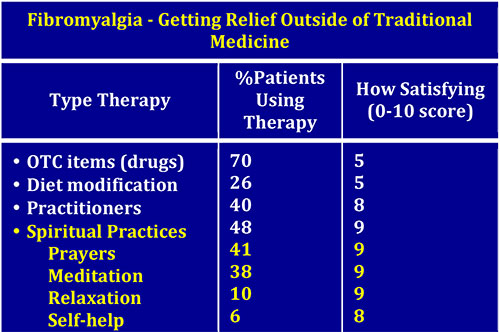That’s the spirit
Albert Einstein once said: “[One] who is seriously involved in the pursuit of science becomes convinced that a Spirit is manifest in the Laws of the Universe … a Spirit vastly superior to that of man, and one in the face of which we, with our modest powers, must feel humble.”
 As researchers continue to explore the connection between spiritual wellbeing and health, Einstein’s words resonate with more clarity than ever before.
As researchers continue to explore the connection between spiritual wellbeing and health, Einstein’s words resonate with more clarity than ever before.
For example, in one large survey of fibromyalgia patients suffering from chronic muscle pain, subjects rated on a scale of 1-10 how satisfied they were with different intervention attempts.
The results in this graphic illustrate how “spiritual practices” can be successful in treating pain from fibromyalgia, and how “alternative care” can deliver more relief than conventional medicine in certain cases.
One explanation for these remarkable results is that spiritual counselors are able to help individuals reduce stress levels that directly relate to increased physical symptoms of pain and suffering.
Defining spiritual health
Spirituality, in this case, does not refer to any organized religion, although spiritual experiences happen to be part of most religious practices. The opposite need not be the case.
Attempting to define the scope of spirituality is difficult and controversial. Many define spirituality as core principles, feelings, and beliefs that motivate one’s life. It centers on a connectedness between body, mind, and spirit — that while the mind alone can be used to influence the physical, it is used most effectively when it is aware of the spirit.
Spiritual health encompasses spirituality and more. To arrive at a useful definition of the spiritual health dimension, one researcher queried health professionals, health educators, health students, and many others working in different health and medical fields.
The resulting definition includes four aspects that are worth considering. (See box at right.)
Spiritual health and medicine
The earliest medicine men and female healers also tended to be religious and spiritual leaders. Many believed they had power over the bad spirits. And since pain and suffering were considered to be of supernatural origin, these spiritual healers were best suited to treat diseases and pain. Health was tied to faith, and healing required divine intervention.
Then along came Greek physician Hippocrates (c.460 — c. 370 BC), who many consider the father of western medicine. Scientific discoveries eventually resulted in a separation between medicine and spirituality (and religion). Medicine followed a course in which healing was recognized as solely a biological or psychological process. Western medicine advanced the notion that germs or other “invading” agents cause disease and pain, thus, prevention or treatment should be based on killing or avoiding the causative agents, nothing more.
But we now know many factors contribute to disease and pain, immunity and resistance, and healing; not only organic factors but social and interpersonal factors as well. Also, we are discovering again, as the ancients knew before us, that spiritual factors play an important role in optimizing health and wellbeing.
An increasing number of physicians are forming alliances with patients and their spiritual practices to more effectively treat the whole person, and the possible root causes of disease, pain, and suffering. Many medical schools and other health-related treatment centers are now installing, as part of their training programs, an understanding of the importance of faith and spirituality in a comprehensive medical care model.
Faith, placebos, and health
To understand how spirituality (faith) in its many forms can impact health and healing, it’s important to fully understand the idea of the “placebo effect,” which I wrote about in my October 2014 column. This effect refers to the physical changes that occur as a result of what we believe a pill, treatment, or procedure will/can do.
Giving a placebo is nearly always more effective than doing nothing. Since about one-third of sick people respond well to a placebo, all well done medical intervention/treatment studies require a placebo-control condition to compare against a “real” intervention/treatment.
The placebo is a way to elicit faith and hope. If a person believes a prescribed treatment is going to work a certain way – even if it’s a sugar pill or “healing hands” – there is a greater than chance occurrence that it will be effective. In these instances, the healer is actually faith, not the pill or the hands. Research shows this belief can create the same biological changes as an active (real) treatment. This result has been demonstrated time and again.
Examples of spirituality and healing
In one powerful demonstration of the placebo effect, doctors gave a drug to pregnant women suffering from severe nausea and vomiting. Patients were told the drug would make them feel better. The drug, however, was ipecac,which is used to induce vomiting. The majority of the women’s nausea and vomiting actually ceased after taking the placebo – literally counteracting the real pharmacologic action of the ipecac.
Such results even extend to surgery where sham surgical procedures (incisions made under anesthesia, but no operations performed) have been shown to be as effective as incisions with actual operations in about half the number of subjects studied. These studies demonstrate how we are able to change what happens in our bodies by altering and controlling the state of our minds. In other words, our beliefs can and do impact health outcomes!
Another example of healing and spirituality is the shrine of the Blessed Virgin Mary in Lourdes, France. In 1858 an unknown peasant girl, Bernadette Soubirous, claimed she saw the Blessed Virgin at the site. Since that time, and the discovery of “healing” springs nearby, there have been countless documented cases of people who’ve brought their faith and belief to the site, and who were cured of severe illness. Moreover, these “cures” have been shown to persist.
Today Lourdes is one of the most visited sites in France, attracting an endless stream of religious pilgrims and tourists. It is among the most important centers of tourism in the country, second only to Paris; Lourdes also is the third most important holy site among the world’s Catholics, after Rome and the Holy City. In France, only Paris, with a population greater than 2.25 million, has more hotel capacity than Lourdes, with a population of about 16,000.
The healing power of the mind
Many researchers conclude that the body’s own healing ability is actually stimulated by a person’s faith and belief in the healer and their methods, an optimistic outlook toward a given treatment, and other psychological variables that, taken together, are termed an attitude of positive spirituality.
The ability of the mind to elicit physiologic responses, even at the cellular level, is well researched and documented. Those who dismiss links between spiritual health and healing are apt to overlook a potentially powerful tool — one that could enhance their own wellbeing.
References
- Bai, M., et al. 2016. “Exploring the individual patterns of spiritual wellbeing in people newly diagnosed with advanced cancer: A cluster analysis.” Quality of Life Research; June 8. [Epub ahead of print].
- Banks, R. 1980. “Health and the spiritual dimension: Relationships and implications for professional preparation programs.” Journal of School Health; 50(4):195.
- Bergin, A.E., Jensen, J.P. 1990. “Religiosity of psychotherapists: A national survey.” Psychotherapy; 27:3.
- Borysenke, J. 1987. “Minding the Body, Mending the Mind.” Reading, Mass.: Addison-Wesley Publ;10.
- Bruno, C. 1997. “Heart and soul: A Psychological and spiritual guide to preventing and healing heart disease.” (Pocket Books).
- CBS News Poll. 1998. “Faith and healing.” Time; June 24, 1996:62.
- Faria, V., et al. 2008. “Imaging the placebo response: A neurofunctional review.” European Neuropsychopharmacology; 18(7):473.
- Hall, D.E., et al. 2008. “Measuring religiousness in health research: Review and critique.” Journal of Religion and Health; 47:134.
- Hamilton, D.G. 1998. “Believing in patients’ beliefs: Physician attunement to the spiritual dimension as a positive factor in patient healing and health.” American Journal of Hospice and Palliative Care; 15(5):276. )
- Harvard Mind/Body Institute Symposium. “Spirituality and healing in medicine.” Salt Lake City, May 2002.
- Kong, J., et al. 2008. “Placebo analgesia: Finding from brain imaging studies and emerging hypotheses.” Reviews in Neuroscience; 18((3/4):173.
- Larson, D.B., Koenig, H.G. 2000. “Is God good for your health? The role of spirituality in medical care.” Cleveland Clinic Journal of Medicine; 67(2):80.
- Larson, D.B. 1993. “The faith factor, Volume II: An annotated bibliography of systematic review and clinical research on spiritual subjects.” Rockville, Md., National Institute for Healthcare Research.
- Matthews, A., Larson, D.B. 1995. “The faith factor, volume III: Enhancing life satisfaction.” Rockville, Md., National Institute for Healthcare Research.
- Phillip, J., et al. 1999. “The correlation between spiritual wellbeing and health behaviors.” American Journal of Health Promotion; 13(3):159.
- Wiech, K., et al. 2008. “Neurocognitive aspects of pain perception.” Trends in Cognitive Science; 12(8):306.
- Young, M. 2011. “Religiosity and health behavior: What does research tell us? “American Journal of Health Education; 42(1):4.




Syd Baxter - 1971
Great article. Do you know of any PARKINSON specific studies that have been done incorporating “alternative” medicine-meditation, yoga, marijuana, etc.?
Reply
Fred Brown - 1990
While recreational pot usage is controversial, many people agree and believe that the drug should be legal for medical uses. Online Budz
Reply